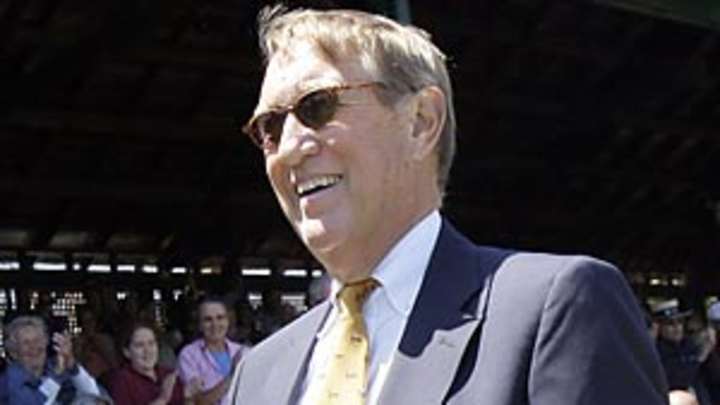Q&A with HOFer Donald Dell


At a bare minimum, when you've represented Robert Kennedy, Arthur Ashe, Michael Jordan, and Jimmy Connors, among others, you ought to have some good stories. And Donald Dell doesn't disappointment. A well-known figure in the tennis world for being the sport's first agent, helping to found the ATP Tour and serving as a U.S. Davis Cup captain, Dell, 71, mixes practical advice and war stories in his new book, Never Make the First Offer.
He recently discussed it with SI.com.
SI.com: I'll not only make the first offer but also will start with a hardball. At least within "agenting circles," your relationship with David Falk is both well-known and much-discussed. Yet his name appear nowhere in the text. What informed this decision?
Dell: David Falk left [Dell's management firm] ProServ in 1992 and for the past 17 years we have had no business dealings nor social activities together. Thus there was no reason to mention him in my book.
SI.com: When you read the final manuscript, which encapsulates a 40-plus-year career, what struck you or surprised you the most?
Dell: In looking back over my 40-year career, it struck me how much my career has been based on building relationships with all types of athletes and business people. Truly it has been a study of human nature in dealing with the people in these relationships, and it has been a great deal of fun as well.
SI.com: Unlike so many of your contemporaries, you're still working. Where do the challenges reside for you?
Dell: Currently I spend much of my time in television-rights negotiations and sports-marketing deals, like endorsements and sponsorships for our clients and events. I am still working full time because I like the people I work with, and still enjoy working in the business of sports marketing very much.
SI.com: Specific to tennis, to what extent are you concerned about the health of the sport? And do you agree with this commonly held belief that because American sports fans are, collectively, provincial, the sport will have a hard time thriving in the U.S. until there are more Americans at the top?
Dell: Specifically I believe the industry numbers of tennis demonstrate the sport is very healthy indeed, but somewhat badly promoted by the WTA, ATP and the USTA. The numbers for tennis are way up (9 percent increase in rackets, shoes and clothing sales over the past three years), and active participants are up 5 percent as well. For example, in my opinion, golf with lesser numbers greatly outpromotes tennis to the public.
Yes, it helps to have up-and-coming young Americans to promote the sport, but I also strongly believe that tennis is truly a global sport, and today non-Americans such as [Roger] Federer, [Rafael] Nadal and [Andy] Murray promote the sport worldwide, including building the sport in America, by their great play.
SI.com: Having helped negotiate the current U.S. Open television deal, what are your thoughts on the Tennis Channel-Cablevision dispute?
Dell: After four years of Tennis Channel trying, I can't understand why Cablevision won't make a reasonable deal with them, in particular to broadcast the U.S. Open and other Grand Slam events. Cablevision's offer has always been a "sports-tier" deal only, and Tennis Channel has never accepted any sports-tier deal. In their footprint, a sports-tier deal would result in 85 percent of Cablevision subscribers not receiving the U.S. Open, which makes no sense. Tennis Channel now has 55 million households for the U.S. Open, and Cablevision subscribers should be a part of this great televised event.
SI.com: Reading your account, I agree that you basically "salvaged" the 1983 U.S. Open final; but it entailed what I think many would consider an ethically questionable maneuver. (I won't give away more details than that.) How does an agent balance his own morality with a duty to act in the best interest of a client?
Dell: I think a reputable agent has to fulfill his own moral, ethical obligations first, while trying to balance the best interest of his client as well. In particular, I thought it was important for the U.S. Open to have a final in 1983, and more important that Jimmy Connors, if physically able, should have the opportunity to compete for the championship. I did not think it was unethical to give him that opportunity.
SI.com: To what extent are (or aren't you) bothered by the current state of the agenting profession? Where do you see it going?
Dell: I am very much bothered by the current state of the profession. As in other walks of life, there are both good and bad agents. But the role of an agent is important, and thus it is very important that they obey the rules and always give honest, truthful advice to their clients. The problem today is many "young" or "new" agents will say anything to make the client happy. In order to get or keep the client, they promise him the moon. In my opinion, this creates tremendous problems for the client later on in his career.
